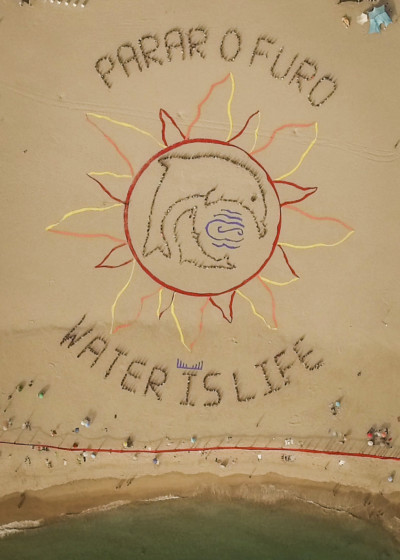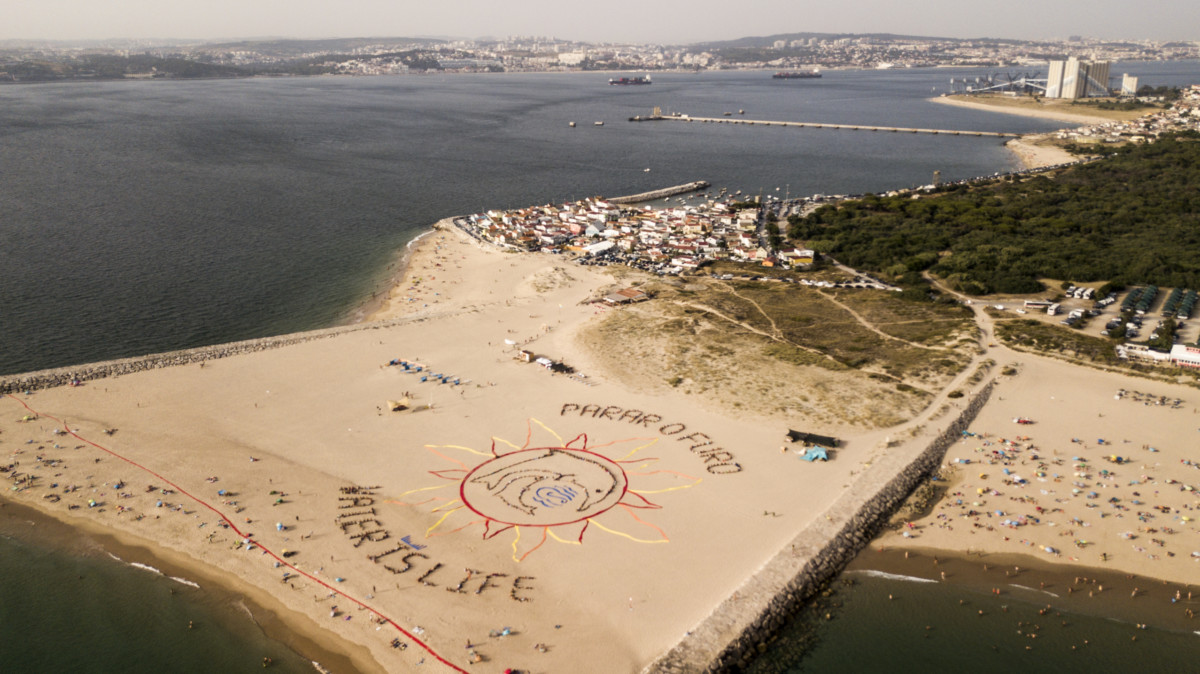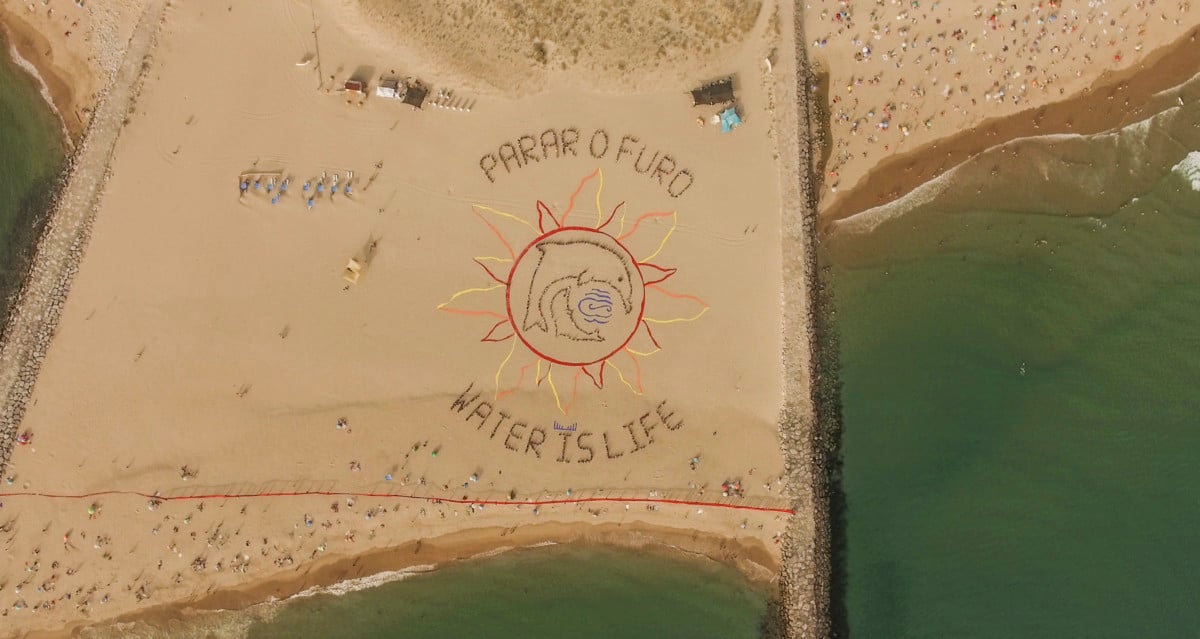Truthout is a vital news source and a living history of political struggle. If you think our work is valuable, support us with a donation of any size.
Around 800 people — including Portuguese activists, surfers, fishers, youths and supporters from around the world — came together on August 4, at Cova do Vapor beach outside Lisbon, Portugal, where the Tagus River meets the Atlantic, to rise up against the country’s plans for offshore oil drilling and inland fracking. The participants used their bodies to form a giant image of a dolphin mother and child, with messages that read from the sky: “Stop the oil drilling” and “Water is life.”
American artist and activist John Quigley, who facilitated the “aerial art action,” addressed participants during the action: “We’re here as part of a growing worldwide movement of water protectors. We’re defending Mother Earth and the sacred waters of this planet, because there’s no life without water. The fate of Portugal hangs in the balance. We say no to Big Oil’s attempt to drill off the beautiful coast which would effectively render it a fossil fuel colony.”
LaDonna Brave Bull Allard, founder of the first resistance camp against the Dakota Access Pipeline at Standing Rock in North Dakota, addressed the Portuguese government: “Right now, you have pristine waters and pristine lands and there’s neither offshore oil drilling nor fracking at this time. I know you just approved it, but I’m asking you to rescind it!”
Conflict of Interest

Plans for fossil fuel extraction are highly controversial in Portugal. Between 2007 and 2012, both center-right and center-left governments granted 15 concessions to various companies for fossil fuel extraction, including fracking, both offshore and inland. Time and again, energy corporations have been given special treatment by the Portuguese government, allowed to evade taxes and given relief from compulsory fees for using sea space, pointing to a cozy relationship with government officials.
But local communities, municipalities, businesses and activists rose up in strong opposition, initiating numerous protests and legal actions. By the end of 2017, the government could only maintain five of the 15 original contracts, due to the public outcry: three for a consortium of the Italian corporation ENI and the Portuguese corporation Galp to drill in deep waters off the shores of the Alentejo and touristic Algarve regions, and two for Australis Oil & Gas to drill in Portugal’s center region.
The tourism businesses of Portugal’s southern Algarve region — which accounts for 34 percent of the country’s tourism — are alarmed, fearing that oil spills could devastate their futures. While scientists suspect that the gas drilling inland would start with conventional methods, it could quickly turn into the country’s first instance of fracking, dangerously next to one of the most important agricultural regions in the country, as well as near the Catholic sanctuary of Fátima and the surf mecca of Nazaré.
A “Declaration of War Against the Algarve”
In September 2017, the secretary of state for energy, Jorge Seguro Sanches, said the government would only advance offshore drilling in the Algarve after considering affected municipalities. Then disregarding the outspoken opposition of these communities, in January 2018, Seguro Sanches gave the green light for ENI and Galp to go ahead with oil prospection this year. Ten Algarve mayors told the government they would interpret this decision as a “declaration of war” against their region. And since the Portuguese Environment Agency announced on May 16 that drilling could begin as soon as September 15, 2018, with no prior environmental impact study, protests have occurred at high frequency.
Activists are accusing the government of hypocrisy, given Prime Minister António Costa’s repeated promise to “decarbonize Portugal by 2050.”
“Portugal has broken many records of renewable energy production. [Production] has exceeded consumption more than once,” climate change researcher João Camargo told Truthout. “The sole reason to drill for fossil fuels is to increase corporate profits. We need to keep them in the ground. Last year’s extreme drought and wildfires, killing over 110 people, show the effects of climate change in our territory.”

A Regenerative Future
Despite their outrage, creativity and hope dominated the mood of those gathered at Cova do Vapor. With solar cookers providing snacks and tea, ritual and songs, people of different generations, cultures and backgrounds came together, celebrating a regenerative future.
The movement rising up in Portugal is burgeoning. On August 13, a court ruling accepted a motion filed by an activist group and suspended the license the government had given for offshore oil drilling to start in September, postponing it to next year. While the struggle is certainly not over, this shows the strength of those fighting for a fossil fuel-free future.
The activists are supported by a diverse group of allies, including the Algarve Tourist Board, the Portuguese Surfing Federation, as well as global voices like playwright Eve Ensler and actors Daryl Hannah and Shailene Woodley. In an open letter, they call out to the Portuguese government to abandon fossil fuel extraction: “Using decentralized solar, wind and wave energy technologies, Portugal could become one of the first countries in the world powered exclusively by renewables and, by restoring ecosystems, could overcome desertification, drought, fire and flood disasters for good.”
A terrifying moment. We appeal for your support.
In the last weeks, we have witnessed an authoritarian assault on communities in Minnesota and across the nation.
The need for truthful, grassroots reporting is urgent at this cataclysmic historical moment. Yet, Trump-aligned billionaires and other allies have taken over many legacy media outlets — the culmination of a decades-long campaign to place control of the narrative into the hands of the political right.
We refuse to let Trump’s blatant propaganda machine go unchecked. Untethered to corporate ownership or advertisers, Truthout remains fearless in our reporting and our determination to use journalism as a tool for justice.
But we need your help just to fund our basic expenses. Over 80 percent of Truthout’s funding comes from small individual donations from our community of readers, and over a third of our total budget is supported by recurring monthly donors.
Truthout has launched a fundraiser to add 379 new monthly donors in the next 6 days. Whether you can make a small monthly donation or a larger one-time gift, Truthout only works with your support.
